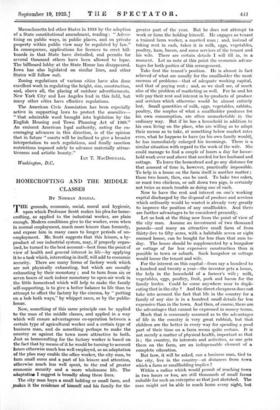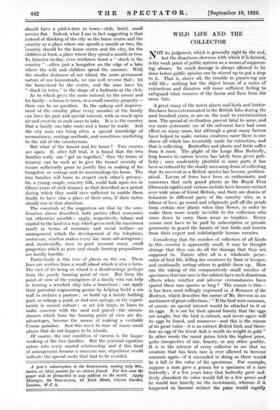HOMECROFTING AND THE MIDDLE CLASSES
BY NORMAN ANGELL.
THE grounds, economic, social, moral and hygienic, upon which Professor Scott makes his plea for home- crofting, as applied to the industrial worker, are plain enough. Modem conditions give to the worker, even when in normal employment, much more leisure than formerly, and expose him in many cases to longer periods of _un- employment. Mr. Scott suggests that this leisure, a by- product of our industrial system, may, if properly organ- ized, be turned to the best account—best from the point of view of health and general interest in life—by applying it to a task which, interesting in itself, will add to economic security. There are many forms of factory work which are not physically exhausting, but which are morally exhausting by their monotony ; and to turn from six or seven hours of such indoor monotony to open-air work in - the little homestead which will help to make the family self-supporting, is to give a better balance to life than to attempt to offset the factory by the cinema, by " putting on a bob both ways," by whippet races, or by the public- house.
Now, something of this same principle can be applied to the man of the middle classes, and applied in a way which will ensure advantageous co-operation between a certain type of agricultural worker and a certain type of business man, and do something perhaps to make the country as against the town more attractive to both. Just as homecrofting for the factory worker is based on the fact that by means of it he would be turning to account hours otherwise much less well employed, so an adaptation of the plan may enable the office worker, the city man, to turn small sums and a part of his leisure and attention, otherwise much less well spent, to the end of greater economic security and a more wholesome life. The adaptatiost I suggest is broadly along these lines.
The city man buys a small holding or small_ farm, and snakes it the residence of himself and his family for_ the greater part of the year. But he does not attempt to work or farm the holding himself. He engages as tenant a trained farm worker, a married man ; and, instead of taking rent in cash, takes it in milk, eggs, vegetables, poultry, ham, bacon, and some services of the tenant and his wife. There are certain details I will fill in, in a moment. Let us note at this point the economic advan- tages for both parties of this arrangement.
Take first the tenant's position. He is almost in fact relieved of what are usually for the smallholder the most onerous of problems—that of adequate working capital, and that of paying rent ; and, as we shall see, of much also of the problem of marketing as well. For he and his wife pay their rent and interest in by-products of produce and services which otherwise would be almost entirely lost. Small quantities of milk, eggs, vegetables, rabbits, poultry, the surplus of what a smallholder produces for his own consumption, are often unmarketable in the ordinary way. But if he has a household in addition to his own living on the place, who are willing so to adapt their menus as to take, at something below market rates even, what he happens to have (as his own family would), he has immediately enlarged his incomings. There is a similar situation with regard to the work of the wife. She could manage to find a couple of hours a day for house- hold work over and above that needed for her husband and cottage. To leave the homestead and go any distance for that amount of time is, however, practically impossible. To help in a house on the farm itself is another matter ; those two hours, then, can be used. To bake two cakes, or roast two chickens, or salt down two pigs, is certainly not twice as much trouble as doing one of each.
Now to have the rent and interest on one's working capital discharged by the disposal of produce and services which ordinarily would be wasted is already very greatly to improve the position of any smallholder. And there are further advantages to be considered presently.
Let us look at the thing now from the point of view of the city man. Assume an investment of two thousand pounds—and many an attractive small farm of from thirty-five to fifty acres, with a habitable seven or eight roomed house, can be bought for less than that sum to- day. The house should be supplemented by a bungalow or cottage of far less expensive construction than is possible in town or suburb. Such bungalow or cottage would house the tenant and wife.
For the interest on this capital—from say a hundred to a hundred and twenty a year—the investor gets a house, the help in the household of a farmer's wife ; milk, vegetables, eggs, poultry, fruit, pork and bacon for the family larder. Could he come anywhere near to dupli- cating that in the city ? And the direct cheapness does not take into account the fact that life in the country for a family of any size is in a hundred small details far less expensive than in the town. And then, of course, there are the advantages that cannot be expressed in money• terms. Much that is commonly assumed as to the advantages of life in the country is very great rubbish, but that children are the better in every way • for spending a good part of their time on a farm seems quite certain. It is not merely a matter of physical health, important as that is ; the country, its interests and activities, as one gets them on the farm, are an indispensable element of a complete education. But how, it will be asked, can a business man, tied to the city, live in the country—at distances from town which a farm or smallholding implies ?
Within a radius which would permit of reaching town in two hours or less, are still thousands of small farms suitable for such an enterprise as that just sketched. The man might not be able to reach home every night, but should have a pied-a-terre in town—club; hotel, small service flat. Indeed, what I am in fact suggesting is that instead of thinking of the city as the home centre and the country as a place where one spends a month or two, the country should be the home centre and the city, for the children at least, a place where they spend a month or two.
In America to-day, even workmen boast a " shack in the country "—often just a bungalow on the edge of a lake where the wife and children spend the summer. With the smaller distances of our island, the more permanent nature of our homesteads, we can well reverse that ; let the homestead be the centre, and the man have his " shack in town," in the shape of a bedroom at the club. As to which gives the more interest to the owner and his family—a house in town, or a small country property— there can be no question. In the upkeep and improve- ment of the country place every member of the family can have his part and special interest, with as much open air and exercise as eaeh cares to take. It is in the country that a family can take roots and a home be made. And the city man can bring often a special knowledge of accountancy, costings methods, and sometimes marketing to the aid of the countryman.
But what of the tenant and his home ? Two courses are open. If, after full trial, it is found that the two families really can " get on together," then the terms of tenancy can be such as to give the tenant security of tenure sufficiently great to justify him in making of his bungalow or cottage and its surroundings his home. The two families will learn to respect each other's privacy. Or, a young couple, country folk, could look upon ten or fifteen years of such tenancy as that described as a period during which they could save sufficient to enable them finally to have also a place of their own, if their tastes should run in that direction.
The essentials of the suggestion are that by the com- bination above described, both parties effect economies not otherwise possible ; apply, respectively; labour and Capital to the land in a way which gives each the maximum result in terms of economic and social welfare—an arrangement which the development of the telephone, motor-car, wireless makes every clay more advantageous ; and, incidentally, turn to good account many small properties which as pure and simple farming propositions are hardly feasible.
Particularly is this true of places on the sea. These lines are written from a small island which is also a farm.
The fact of its being an island is a disadvantage perhaps from the purely farming point of view. But from the point of view of the youngsters of a family who can help in turning a wrecked ship into a houseboat ; can apply their potential engineering genius by helping build a sea wall to reclaim a pasture ; or build up a handy bathing pool, or enlarge a pond, or find new springs, or try experi- ments in mussel culture ; or set fish traps, or learn to make concrete with the sand and gravel—the circum- stances which from the farming point of view are dis- advantages,' become the means of making a veritable Crusoe paradise. And this must be true of many small places that do not happen to be islands.
Of course, the one condition of success is the happy working of the two families. But the personal equation enters into every mortal relationship, and if this kind of arrangement became a common one, experience would indicate the special rocks that had to• be avoided.











































 Previous page
Previous page